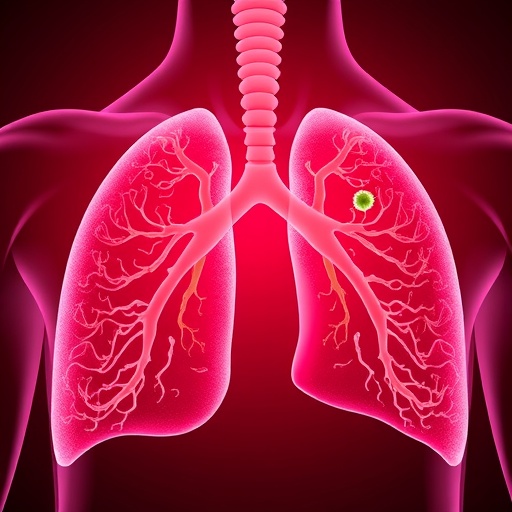
In a groundbreaking study set to reshape our understanding of lung adenocarcinomaâs resistance to immune-based therapies, researchers have uncovered a novel mechanism by which KRAS mutations promote immune escape. Published in BMC Cancer, the study reveals an intricate molecular pathway involving ZNF24, SLC7A5, and PD-L1 that crucially undermines the anti-tumor activity of CD8+ T cells. This discovery not only sheds light on the cancerâs evasive tactics but also opens promising avenues for targeted therapeutic interventions.
Lung adenocarcinoma, a predominant subtype of non-small cell lung cancer (NSCLC), is frequently driven by mutations in the KRAS oncogene. While KRAS mutations have long been linked to tumor proliferation and poor prognosis, their role in modulating the tumor immune microenvironment has remained elusive. The current study focuses on the molecular crosstalk between KRAS mutations and immune checkpoint regulation, particularly how PD-L1 expression is upregulated, facilitating tumor immune escape.
The immune checkpoint molecule PD-L1 serves as a primary shield for tumor cells, binding to PD-1 receptors on CD8+ cytotoxic T lymphocytes to inhibit their function. This interaction dampens the immune systemâs ability to recognize and eliminate malignant cells. Although KRAS mutation was previously observed to elevate PD-L1 levels, the underlying signaling intermediates responsible for this regulation had not been fully elucidated until now.
Through meticulous analysis of lung adenocarcinoma tissue samples and cell lines harboring KRAS mutations, the researchers found a direct correlation between KRAS activity and the expression of ZNF24, a zinc finger transcription factor, and SLC7A5, an amino acid transporter. ZNF24 appears to act as a pivotal regulator that links KRAS signaling to the enhancement of PD-L1 expression via SLC7A5, effectively creating an immune-suppressive milieu.
Experimental data demonstrated that mutant KRAS upregulates ZNF24, which in turn increases the expression of SLC7A5. This transporter not only facilitates nutrient uptake critical to tumor growth but also mediates the elevation of PD-L1 on the tumor cell surface. Consequently, PD-L1âs interaction with PD-1 on CD8+ T cells leads to their inactivation, allowing the tumor cells to evade immune detection and destruction.
To validate these findings, the study utilized both in vitro coculture systems and in vivo murine models. CD8+ T cells exposed to KRAS mutant tumor cells exhibited markedly reduced cytotoxic activity, confirming that the ZNF24/SLC7A5/PD-L1 axis exerts a potent immunosuppressive effect. Importantly, the suppression of ZNF24 reversed PD-L1 overexpression and reinstated CD8+ T cell function, highlighting the axis as a promising therapeutic target.
In a pioneering effort, the researchers identified Daptomycin (DAPT), an antibiotic conventionally used to treat bacterial infections, as the first known inhibitor of ZNF24. Molecular binding assays revealed that DAPT interacts directly with ZNF24, effectively incapacitating its transcriptional regulatory function. This unprecedented finding repurposes an existing drug as a potential modulator of immune checkpoint pathways in cancer.
Combination therapy experiments further underscored the translational significance of these discoveries. Combining DAPT with anti-PD-L1 monoclonal antibodies synergistically enhanced CD8+ T cell-mediated tumor killing in KRAS mutant models, surpassing the efficacy of either agent alone. This synergy provides a compelling rationale for clinical trials exploring dual targeting of ZNF24 and PD-L1 in lung adenocarcinoma patients.
The implications of this research extend beyond lung adenocarcinoma, considering that KRAS mutations and PD-L1-mediated immune evasion are common hallmarks in various malignancies. Targeting the newly defined ZNF24/SLC7A5/PD-L1 axis may revolutionize immunotherapy, particularly for tumors notoriously resistant to current checkpoint inhibitors.
Furthermore, the study underscores the importance of dissecting the nuanced molecular networks orchestrated by oncogenic mutations. As cancer therapy evolves toward precision medicine, understanding how mutations like those in KRAS drive immune escape mechanisms will be paramount in designing effective combination regimens that restore antitumor immunity.
While PD-1/PD-L1 inhibitors have transformed the clinical landscape for many cancer patients, their success in KRAS mutant lung adenocarcinoma has been limited. The revelation of ZNF24 as a nodal point controlling PD-L1 expression offers a novel target to circumvent innate resistance, potentially expanding the benefit of immunotherapy to a broader patient population.
This comprehensive investigation also prompts deeper inquiry into the role of amino acid transporters such as SLC7A5 in tumor-immune interactions. Beyond nutrient provision, SLC7A5âs involvement in immune checkpoint regulation reflects the complex metabolic-immune axis exploited by cancer cells to survive hostile environments.
Looking ahead, clinical translation will require rigorous evaluation of DAPT and related compoundsâ safety and efficacy in oncology settings. Nonetheless, repositioning existing drugs offers a pragmatic shortcut in drug development, potentially accelerating the availability of novel treatments for patients with limited options.
In sum, this landmark study delineates a previously unrecognized pathway by which KRAS mutations hijack immune checkpoint regulation, fostering immune escape through a cascade involving ZNF24 and SLC7A5 that culminates in PD-L1 upregulation. The identification of a pharmacological inhibitor that can disrupt this axis represents a transformative advance with far-reaching therapeutic implications.
Ongoing research will no doubt build upon this foundation, exploring combinatorial strategies that integrate metabolic modulation and immune checkpoint blockade. Ultimately, these insights bring us closer to overcoming one of the most resilient barriers in cancer treatment: the tumorâs capacity to silently thwart immune surveillance.
Subject of Research: KRAS mutation-induced immune escape mechanisms in lung adenocarcinoma via the ZNF24/SLC7A5/PD-L1 signaling axis.
Article Title: KRAS mutation promotes immune escape of lung adenocarcinoma via ZNF24/SLC7A5/PD-L1 axis.
Article References:
Li, L., Feng, Q., Jiang, Y. et al. KRAS mutation promotes immune escape of lung adenocarcinoma via ZNF24/SLC7A5/PD-L1 axis. BMC Cancer 25, 1417 (2025). https://doi.org/10.1186/s12885-025-14336-0
Image Credits: Scienmag.com
DOI: https://doi.org/10.1186/s12885-025-14336-0
Tags: cancer immune microenvironment dynamicsCD8+ T cell inhibitionimmune checkpoint inhibitors in NSCLCimmune escape mechanisms in adenocarcinomaKRAS mutation in lung cancermolecular pathways in cancer immunitynon-small cell lung cancer researchPD-L1 regulation in tumorstargeted therapies for lung cancertherapeutic interventions for KRAS-driven tumorsunderstanding lung adenocarcinoma resistance to therapiesZNF24 and SLC7A5 roles in immune response




